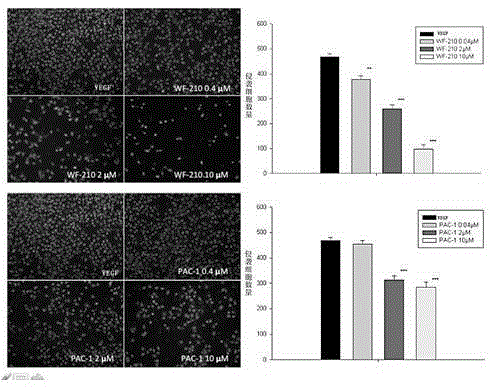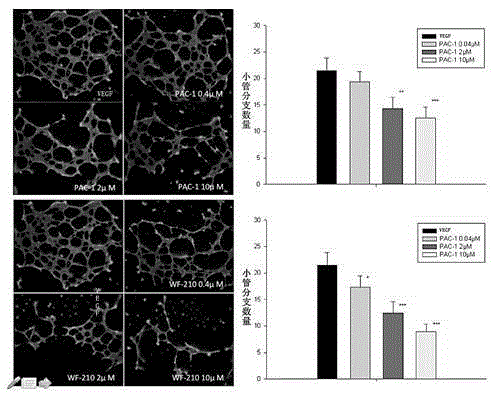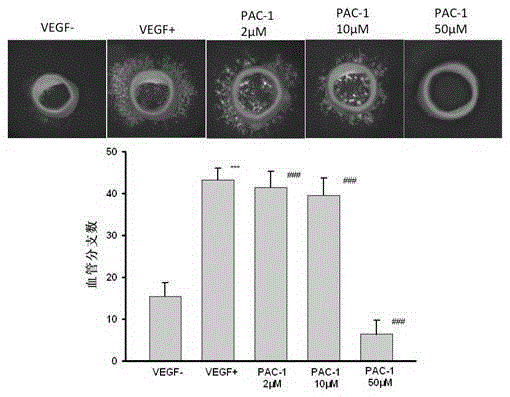Use of oxadiazolylpiperazine compound in the preparation of anti-angiogenic drugs
An angiogenesis and compound technology, which is applied in the field of medicine, can solve the problems of unpublished anti-angiogenesis research data, etc., and achieve the goal of inhibiting the formation of microvessels in rat arterial rings, inhibiting the formation of microtubules in endothelial cells, and inhibiting migration with resistance Effect
- Summary
- Abstract
- Description
- Claims
- Application Information
AI Technical Summary
Problems solved by technology
Method used
Image
Examples
Embodiment 1
[0021] Example 1. Effect of PAC-1 and WF-210 on VEGF-induced invasion ability of human umbilical vein endothelial cells (HUVEC)
[0022] 1.1 Materials
[0023] Primary HUVEC cells, culture medium, LSGS, and trypsin were purchased from Gibco, Transwell chambers were purchased from Corning, matrigel was purchased from BD, and calcein was purchased from Sigma.
[0024] 1.2 Experimental method
[0025] PAC-1 and WF-210 were dissolved in DMSO into 100mM stock solution and diluted with culture medium before use; HUVEC cells were cultured in an incubator with 5% CO2 and 37°C saturated humidity. The culture solution was mixed with 90% M200 basal medium and 2% LSGS, and sterilized by filtration with a 0.22 μm filter membrane. The Transwell chamber was coated with 1:8 Matrigel mixed with the culture medium, solidified at 37°C for 0.5 h, and then used for later use. Add 200 μl of VEGF-free culture medium to the upper chamber, 500 μl of VEGF-containing culture medium to the lower chambe...
Embodiment 2
[0029] Embodiment 2, the influence of PAC-1, WF-210 on VEGF-induced human umbilical vein endothelial cells (HUVEC) tubule formation
[0030] 2.1 Materials
[0031] Primary HUVEC cells, culture medium, LSGS, and trypsin were purchased from Gibco, 96-well plates were purchased from Corning, matrigel was purchased from BD, and calcein was purchased from Sigma.
[0032] 2.2 Method
[0033] PAC-1 and WF-210 were dissolved in DMSO into 100mM stock solution and diluted with culture medium before use; HUVEC cells were cultured in an incubator with 5% CO2 and 37°C saturated humidity. The culture solution was mixed with 90% M200 basal medium and 2% LSGS, and sterilized by filtration with a 0.22 μm filter membrane.
[0034] Add 1:1 Matrigel and culture medium to the 96-well plate, and add 100 μL of HUVEC cell suspension after 1 hour of coagulation at 37 degrees, with 15,000 cells per well. After 12 hours of culture, take pictures and observe. The VEGF stimulation concentration is 10 ng...
Embodiment 3
[0038] Example 3. Effect of PAC-1 and WF-210 on neovascularization of rat arterial ring
[0039] 3.1 Materials
[0040] Male SD rats aged 4-6 weeks were purchased from the Experimental Animal Center, culture medium and Hank’s solution were purchased from Gibco, 96-well plates were purchased from Corning, matrigel was purchased from BD, and calcein was purchased from Sigma.
[0041] 3.2 Method
[0042] PAC-1 and WF-210 were dissolved in DMSO into 100mM stock solution, and diluted with culture medium immediately before use. Take a section of blood vessel from the aortic arch to the renal artery of immature rats, wash it three times with Hank's solution, separate and remove the connective tissue, cut it into small pieces of 1-1.5 mm, and put it into 96 microliters containing 25 μl of solidified Matrigel (1:1). In the well plate, spread 25 μl of Matrigel again, solidify at 37 degrees for more than 1 hour, add 50 μl of culture medium, add VEGF and drug stimulation after culturing...
PUM
 Login to View More
Login to View More Abstract
Description
Claims
Application Information
 Login to View More
Login to View More - R&D
- Intellectual Property
- Life Sciences
- Materials
- Tech Scout
- Unparalleled Data Quality
- Higher Quality Content
- 60% Fewer Hallucinations
Browse by: Latest US Patents, China's latest patents, Technical Efficacy Thesaurus, Application Domain, Technology Topic, Popular Technical Reports.
© 2025 PatSnap. All rights reserved.Legal|Privacy policy|Modern Slavery Act Transparency Statement|Sitemap|About US| Contact US: help@patsnap.com



